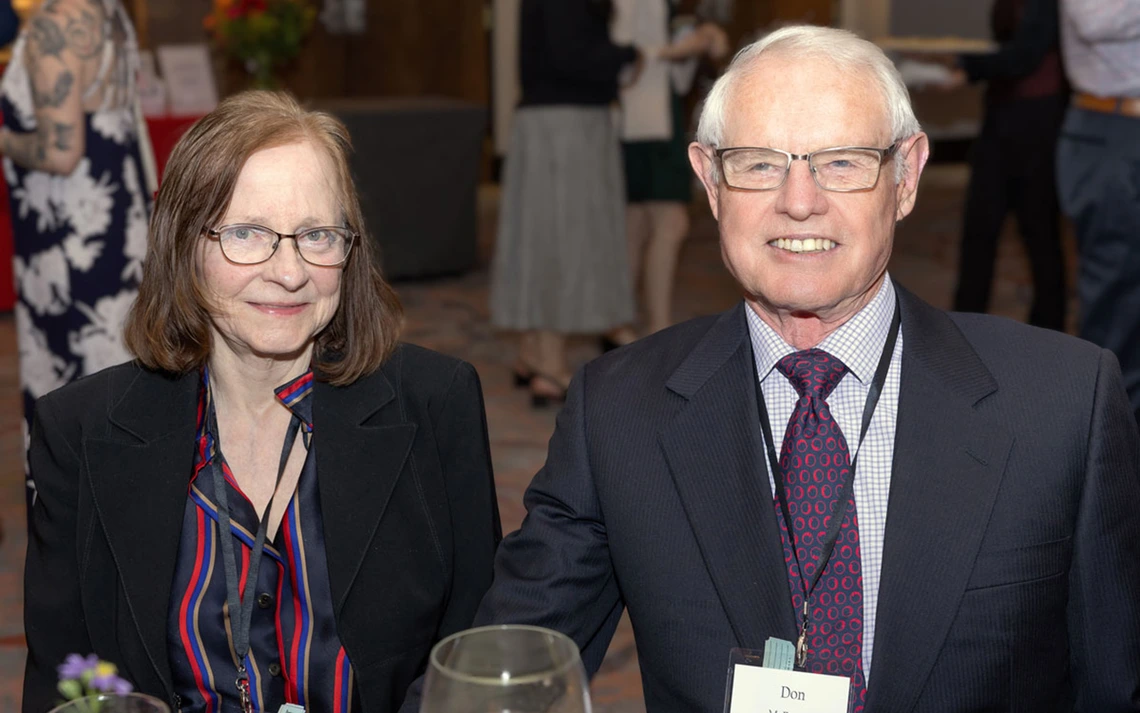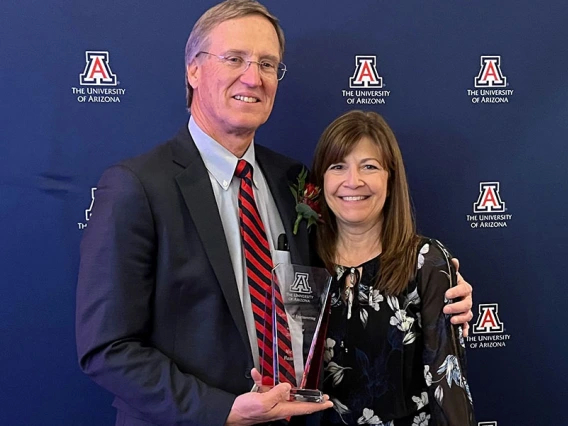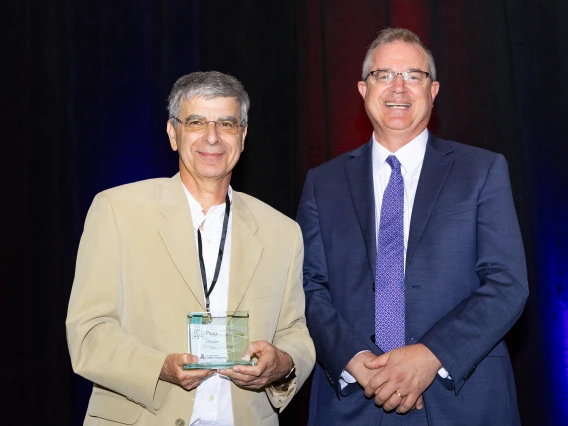McDonald family makes $1M commitment to bolster BME design projects and scholarships
Involvement with the College of Engineering’s Interdisciplinary Capstone program motivates couple’s generosity.

Sherry (left) and Don McDonald’s bequest supports biomedical engineering capstone projects and scholarships for hometown students.
Over the past six years, Don McDonald has mentored over 30 capstone teams to success at Craig M. Berge Design Day. Now, he and his wife, Sherry McDonald, are taking their support even further with a $1 million bequest for scholarships and biomedical engineering capstone projects at the University of Arizona.
“I’m thankful to Sherry and Don for making this commitment to the department and the college,” said Mario Romero-Ortega, head of the Department of Biomedical Engineering. “This supports our shared vision of training students to solve pressing medical challenges with innovation and collaborative work and who will improve health care in Arizona and the nation.”
Students are required to complete the Engineering 498 Interdisciplinary Capstone course before graduation. For the class, teams spend a year designing, prototyping and testing projects for corporate sponsors or on-campus partners like the biomedical department. Upon completion, they showcase their work to industry judges, mentors, faculty and the public at Design Day.
Hometown hero
Don enrolled in the Department of Electrical and Computer Engineering after graduating from Mingus Union High School in Cottonwood, Arizona. He earned a bachelor’s in electrical engineering in 1965.
“It was clear to me that electrical was interesting, and it looked like the future,” he said.
After graduation, Don quickly climbed the ladder to manage large wafer fabrication factories for Advanced Micro Devices and went on to a successful 40-year career in the semiconductor industry. Among other roles, he was the chief operating officer and member of the board of directors for Intense Photonics, a semiconductor laser design and manufacturing company. He was also president and CEO of JDS Uniphase Netherlands, another semiconductor laser business.
To give something back to the communities that shaped his path, Don and his wife of 57 years included in their bequest the establishment of the W. Don and Sherry L. McDonald Endowed Scholarship to assist Mingus alumni, Arizona high schoolers, and biomedical engineering undergraduates and graduates in pursuing engineering careers.
Applying industry knowledge to mentorship
In addition to his storied career in the semiconductor industry, Don is also an entrepreneur. He was president and founder of C2KM Consulting Group, Inc. and DRS Consulting Group, Inc. In his role as a capstone mentor, he brings those advanced skills, which go beyond technical knowledge.
“Don McDonald’s expertise is critical to the success of our capstone students,” said David W. Hahn, the Craig M. Berge Dean of the College of Engineering. “His firsthand experience in the semiconductor industry brings valuable wisdom in advanced electrical engineering and business management to our teams. He is a valued mentor to our many students.”
Don first joined the Interdisciplinary Capstone program as a Design Day judge in 2016. He decided that one day of service wasn’t enough, becoming a capstone project mentor two years later.
“When I first came, I chose some biomedical projects,” he said. “I found that I really liked the intersection of engineering and medicine. It seemed to be an underserved area.”
And Sherry supported and inspired him throughout the journey, eagerly discussing all those projects with him. In her career, she worked in doctors’ offices and hospitals, later acting as secretary-treasurer for Don’s consulting businesses.
“She had all this medical background, and she found it fascinating,” he said.
Their shared interest in biomedical projects prompted the couple to establish another gift, the W. Don and Sherry L. McDonald Biomedical Engineering Endowment. The fund is dedicated specifically to sponsoring biomedical engineering capstone projects.
These projects present an added level of logistical difficulty, as they regularly deal with cells and biologics, which are drugs made from living organisms. At the start of each capstone course, Don needs to spend much of his time just trying to find a suitable lab for the teams.
“We always went to Don first to make sure everything was good,” said Bella Klein, Team 25041 lead and a recent graduate in biomedical engineering.
For the project, the team trained three artificial intelligence models to direct tools in a smart patient exam room. These AI devices assist doctors in tracking the behavior and physicality of patients presented during an exam.
“Don was always diligent in his communication and incredibly supportive of our work,” said Klein.
Don’s support also extended beyond academics, as he wrote her a letter of recommendation for applications to graduate optometry schools.
Three other teams Don mentored this year won awards: Team 25040 won the Sharon ONeal Social Impact Award for a detection system that identifies microplastics, heavy metals and inorganics in water. Team 25044 won the W.L. Gore and Associates Award for Lifelong Innovation with its 3D ultrasound foot scanner, which detects early signs of arch collapse. And Team 25016 won the Rincon Research Award for Best Presentation for optimizing the microparticle fabrication process.
Don hopes to see more Design Day prizes go to biomedical projects with help from the fund. In the meantime, he will continue his mentorship role and plans to sponsor a project next year.
“I like this mentoring job because I think I have an impact on the students. I think it’s good for them, and frankly it’s good for me,” he said.
“It keeps me focused on what is going on with the newer generation of engineers, and I can help guide those people to be better at establishing their careers and joining the engineering community as a whole.”



